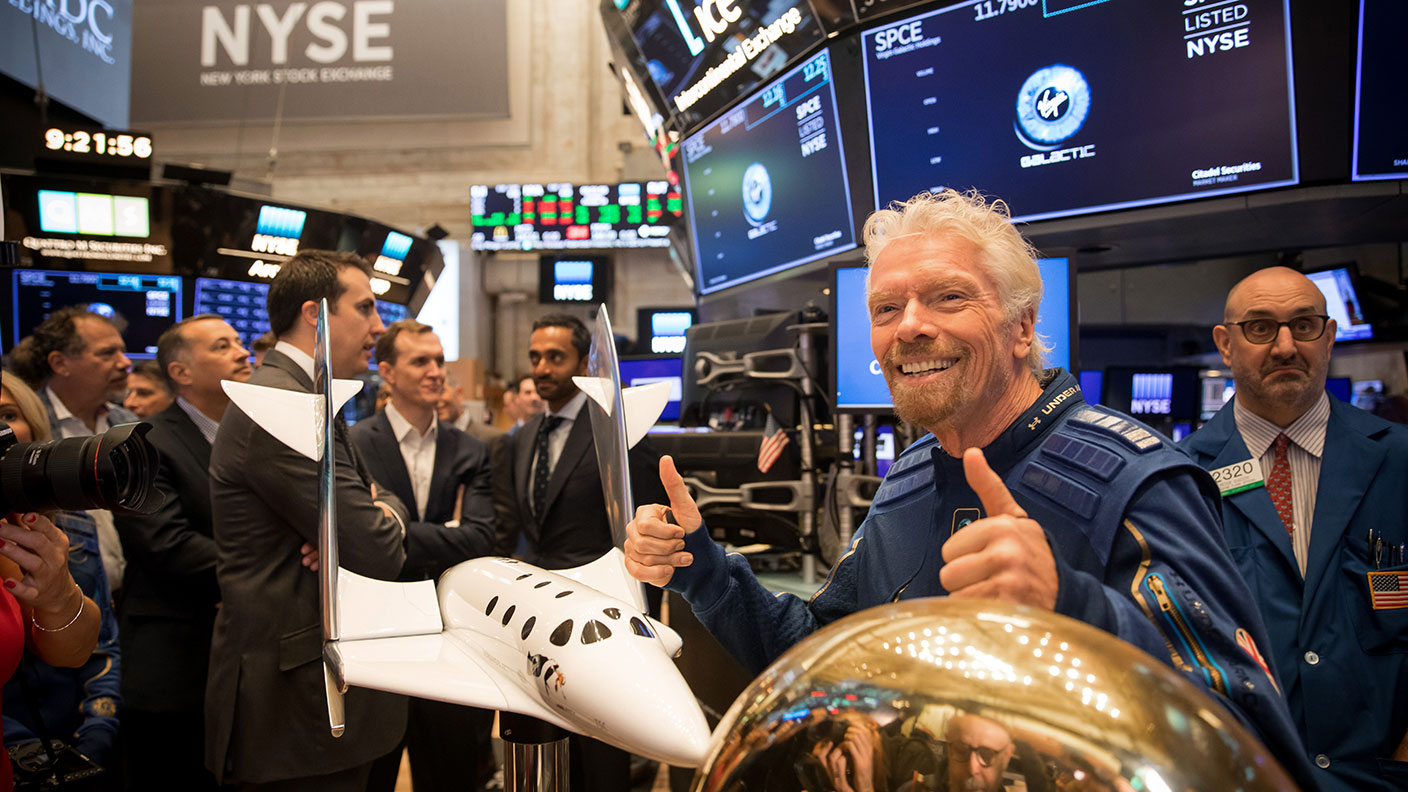Is there life on Mars? Maybe not – but there’s money in space
With news of running water on Mars, people are excited about space exploration again. That's good for the global space industry – and for those who invest in it.

Get the latest financial news, insights and expert analysis from our award-winning MoneyWeek team, to help you understand what really matters when it comes to your finances.
You are now subscribed
Your newsletter sign-up was successful
Want to add more newsletters?

Twice daily
MoneyWeek
Get the latest financial news, insights and expert analysis from our award-winning MoneyWeek team, to help you understand what really matters when it comes to your finances.

Four times a week
Look After My Bills
Sign up to our free money-saving newsletter, filled with the latest news and expert advice to help you find the best tips and deals for managing your bills. Start saving today!
"It's life, Jim, but not as we know it."
US space agency Nasa got everyone excited this week when it said that it reckons it has found evidence of running water on Mars.
Does life lurk in the Martian damp patches? Do we now need to fret about interplanetary pollution as well as VW emissions?
MoneyWeek
Subscribe to MoneyWeek today and get your first six magazine issues absolutely FREE

Sign up to Money Morning
Don't miss the latest investment and personal finances news, market analysis, plus money-saving tips with our free twice-daily newsletter
Don't miss the latest investment and personal finances news, market analysis, plus money-saving tips with our free twice-daily newsletter
Or is this a canny move by Nasa's PR department, just as its annual budget battle coincides with the release of The Martian, a major sci-fi film about a manned mission to Mars?
Whatever your take cynic or stargazer it's certainly got people excited about the prospect of space travel again. That can only be good news for the burgeoning global space industry and those who invest in it
Today's space industry is less ambitious, but it's a lot better funded
The idea of running water on Mars is certainly exciting. But it's just worth noting a couple of points. Firstly, this is indirect evidence we haven't got pictures of a Martian Niagara Falls yet.
Secondly, the exceptionally high levels of salt in this water would still make microbe life unlikely, as we know that they can exist in extreme conditions on our planet.
Even so, it's another reason to push for a long-run manned mission to Mars. Buzz Aldrin wants to see one in the next 15 years. We've been here before, of course. During the 1950s and 60s everyone was convinced that frequent interstellar travel was only a few years away.
In London's Science Museum, you can see Soviet posters showing people living in large-scale space colonies. Of course, as it turned out, the "worker's paradise" couldn't deliver basic consumer goods to its own citizens, let alone to those on other planets.
The West was little better at keeping its feet on the ground. The biggest act of hubris was the decision of both Pan-Am and TWA to take reservations for future flights to the moon.Both airlines ended up going bankrupt in 1991 and 2001 respectively having ferried a grand total of no passengers to the moon.
But from an investor's point of view, the good news is that, away from the headline-grabbing stories about Mars, today's space industry today is much more modest in ambition, at least in the short-term.
The main focus is not on grand humanity-changing projects, but on launching satellites and unmanned probes. But having more realistic goals is not a bad idea if it means that you can meet them.
At the same time, while the ambitions are more modest, the scale of investment is much greater. The race for the moon was effectively a Cold War propaganda battle between the US and the USSR. But now around 70 countries have some sort of space programme, with eight spending more than $1bn a year.
The satellite business is booming
So what are they doing with all that money?The biggest sector of the space industry is currently satellites. These account for around two-thirds of space-related spending.
Satellites do everything from tracking armies, to broadcasting TV images around the world, to monitoring the weather. That alone can make a huge difference to people's welfare. Two years ago, for example, an Indian weather satellite enabled the authorities to shift 800,000 people out of the path of a pending cyclone, saving tens of thousands of lives.
On a smaller scale, satellites are also being used in the US to help farmers monitor moisture levels in their soil, helping them micro-manage crops during droughts.
Banks and hedge funds are taking an interest too. The super-detailed images can pick up data that could give an observant investor an edge' on trends the market has yet to spot. For example, you could count the number of cars in a shopping centre's car park to predict sales trends before even head office knows.
Combine this data with big data' software analysis, and you could use satellites for tracking economic trends more accurately than the surveys currently widely used.
Fancy a gap year on the moon? It's coming ever closer
That's all very worthwhile but what about package holidays to Mars?
The idea of routine space travel still grips the imagination of many entrepreneurs, and private companies have been buying spots on space missions since 1984 for example, in the early 2000s, several millionaires with astronaut ambitions took advantage of Russia's need for foreign cash to pay for trips to the International Space Station.
And, very gradually, private companies are getting in on the space game. Three years ago SpaceX, run by Elon Musk of Tesla fame, carried out the first independent trip to the International Space Station.
While Space X's current focus is on doing work for Nasa, it showed that a private company could create and operate a spacecraft. Musk hopes to run an independent mission to Mars at some point.
Meanwhile, several companies are now competing to make brief journeys beyond Earth's limits for paying guests at prices accessible to the merely rich, rather than the billionaires of this world.
Richard Branson's Virgin Galactic claims that 700 people have already signed up, and that the final phase of testing will start next year. The company has already missed several deadlines, and its credibility suffered a serious blow following a fatal crash last year.
But it's far from being the lone vanity project of a headline-hungry entrepreneur. Virgin has serious competition from two other companies: XCOR and EADS Astrium are also developing commercial sub-orbital flights.
Overall, this is a significant industrial sector. The Space Foundation, which keeps the most detailed data on the industry, estimates that it is worth $330bn, and that's growing at a rate of 9% a year. Non-governmental spending is growing even more rapidly, at 12.9%.
That seems like an opportunity that's too good to miss. We'll be taking another look at the industry in an forthcoming issue of MoneyWeek magazine, along with some of the best ways to profit from it.
If you're not already a subscriber, sign up now.
Get the latest financial news, insights and expert analysis from our award-winning MoneyWeek team, to help you understand what really matters when it comes to your finances.

-
 How a ‘great view’ from your home can boost its value by 35%
How a ‘great view’ from your home can boost its value by 35%A house that comes with a picturesque backdrop could add tens of thousands of pounds to its asking price – but how does each region compare?
-
 What is a care fees annuity and how much does it cost?
What is a care fees annuity and how much does it cost?How we will be cared for in our later years – and how much we are willing to pay for it – are conversations best had as early as possible. One option to cover the cost is a care fees annuity. We look at the pros and cons.
-
 Invest in space: the final frontier for investors
Invest in space: the final frontier for investorsCover Story Matthew Partridge takes a look at how to invest in space, and explores the top stocks to buy to build exposure to this rapidly expanding sector.
-
Three space stocks for adventurous investors
Tips Micah Walter-Range, index creator for the world’s first space ETF, selects three of his favourite space stocks to buy now.
-
 The space race: exciting, but not necessarily profitable
The space race: exciting, but not necessarily profitableOpinion The new space race will spawn a host of new companies wanting to cash in. But investors should tread very carefully, says Merryn Somerset Webb: most will fail.
-
 A new investment trust to profit from the space race
A new investment trust to profit from the space raceTips There is now an investment trust focusing on the space sector. It looks intriguing, says David Stevenson – but highly risky.
-
 Reach for the stars: how to profit from a new era of space exploration
Reach for the stars: how to profit from a new era of space explorationCover Story It has been almost 50 years since someone walked on the Moon and Mars seemed just a short hop away. But now the final frontier is back in fashion, spelling opportunity in a wide range of sectors, says Ben Judge.
-
Space exploration is booming – now’s the time to back it
Opinion Will space exploration be the next boom industry? Perhaps, says Matthew Lynn. And now is the time to buy in.
-
 Visionary investors should place their bets in the space race
Visionary investors should place their bets in the space raceCover Story It’s not just eccentric and ultra-rich tycoons heading into space. From asteroid mining to space hotels, promising profit opportunities now lie off-planet. Set your sights on the stars, says Stephen Connolly.
-
Why I love the space game
Features Nasa pulling out of the low-earth orbit business has opened up opportunities for daring high tech rocket companies to fill the void, says Paul Hill.